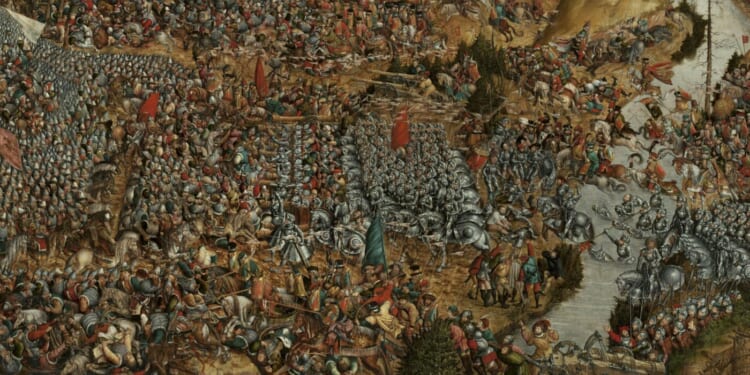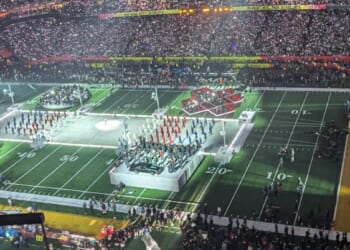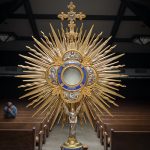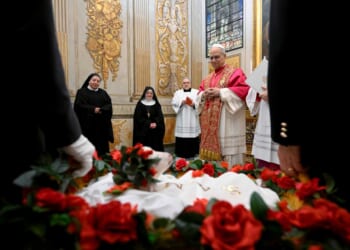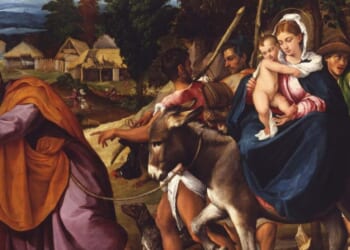And Joshua mowed down Amalek and his people with the edge of the sword.
The Amalekites, a persistent enemy of the Chosen People, were a warlike and violent group who roamed south of Israel. After ambushing the Israelites during their Exodus from Egypt, killing weary travelers—including the elderly, women, and children—Moses gave Joshua the order to fight them.
While Joshua and his men engaged in battle, Moses stood above them on a mountain with his arms raised. When Moses became tired and dropped his arms, the Amalekites had the better of the fight. Noticing this, the priests Aaron and Hur found a large rock for Moses to sit on, and they held up his arms.
The whole scene was quite strange. Justin Martyr (c. 165 AD) wrote that the seemingly better position for Moses would have been on his knees, or prostrate on the ground, as opposed to standing/sitting with his arms stretched out. Yet Moses remained in that position until sunset, while Joshua mowed down Amalek and his people with the sword.
The very next verse after this passage states:
And the Lord said to Moses, “Write this as a memorial in a book and recite it in the ears of Joshua, that I will utterly blot out the remembrance of Amalek from under heaven.”
They were indeed blotted out, but it took a while. After about 300 years of demoralizing Amalekite attacks, God commanded Israel’s first king, Saul, to destroy the Amalekites and everything they owned. But King Saul disobeyed. He did not kill the Amalekite king, and he kept livestock for “sacrifice” (or so he claimed). For his disobedience, King Saul fell out of favor with God.
Shortly after David became king, the Amalekites raided and burned an Israeli town and took all the women and children, including two of David’s wives. David ordered a priest to bring him the ephod, the special garment worn for worship (something akin to the outer garment, the chasuble, that I wear for Mass), and he asked the Lord if he should pursue the raiding party. The Lord answered, “Yes, pursue and rescue your people.”
David fought and recovered all that the Amalekites had taken. “Now there was nothing missing, from the smallest thing to the greatest, neither sons, nor daughters, or plunder, or anything which they had taken. David brought back all of it” (1 Sam. 30). So, unlike King Saul who held back, King David completed the job and once and for all put an end to the Amalekite menace.
These are brutal passages from the Old Testament. They prompt us to ask, “Why would God command the killing off of an entire group of people? Why would God mandate genocide?” After reading these passages, people like to conclude that the God of the Old Testament is mean and vengeful, while the God of the New Testament (Jesus) is nice and merciful.
However, someone wrote:
God’s love does not negate His justice. In fact, a God who does not judge evil is not truly good. The Amalekites’ actions were evil, persistent, and unrepentant. God’s judgment was not rash but righteous, after centuries of warning and patience.
Even in judgment, God’s purposes are redemptive. The Amalekites needed to be removed to protect the Israelites and preserve the line of the promised Messiah.
My friends, the promised Messiah arrived 2000 years ago. The Old Law, which Scripture shows was temporary, was fulfilled and completed by the New Law, who is Jesus Christ. What does that mean for you?
It means that if you read the Old Testament and do not see Christ in it, then you’re reading it wrong. That’s not simply my opinion. The early Church Fathers and Christ Himself attest to it. If you don’t see that the Old Testament is one big pre-figuration of Christ, then you might try to solve modern-day political problems by citing Exodus and God’s mandate to wipe out the persistent enemy of Israel, the Amalekites. Others might claim that genocide in and around the surrounding areas of the Holy Land is necessary to protect Israel and preserve the line of the promised Messiah.
But do you see the problem? The Messiah already came. To go along with the idea that another Messiah is coming is to deny Christ. Are you prepared to do that?
Christ told the Jews shortly before He died that they were reading the Scriptures wrong (see Mt. 21). And after He rose from the dead, Christ opened Scripture to show His disciples that it was all about Him—and no one else. Christ, and Christ alone, is the way, the truth, and the life. Because of this, God does not will a plurality of religions. No, the devil wills that in his attempt to divide and conquer us.
So, let’s understand: various ancient countries surrounding the modern political state of Israel are not the Amalekites. Those countries do not need to be demoralized, destabilized, and wiped out in a vain attempt to usher in the Messiah. The persistent enemy who needs to be wiped out, the warlike and violent one who respects no borders is Satan.
Since we have a persistent enemy out to demoralize and destroy us, our promised Messiah taught us to pray with persistence.
Why must we pray? Listen to Pope St. John Paul II, whose feast day we celebrate today:
- Because we are believers:
Prayer is the recognition of our limitation and dependence: we come from God, we belong to God, and we return to God. We cannot, therefore, but abandon ourselves to Him, our Creator and our Lord, with full and complete confidence.
- Because we are Christians and therefore must pray as Christians:
As a man the life of Jesus was a continual prayer, a continual act of worship and love of the Father. Since the maximum expression of prayer is sacrifice, the summit of Jesus’ prayer is the Sacrifice of the Cross, anticipated by the Eucharist at the Last Supper and handed down by means of the Holy Mass throughout the centuries.
(Audience with Young People, select passages, 1979)
My friends, we’ve gone along with evil and crimes against humanity long enough, excusing our cowardice as inclusivity and tolerance. We’ve apologized for being Christian long enough. It’s time to stop doing that, and from now on pursue our enemy (sin and death) and rescue souls—for God has given us the order to fight. We’ve waited way too long to do so, and as a result we find ourselves in the sunset of Christian Civilization.
But take heart. Christ, the New Law, is the new Moses, and He mystically remains in His strange position on the mountain overlooking the battle. As long as He is up there, we have the better of the fight. We do not have to worry about His hands lowering—because they’re nailed in place.
On Calvary the Son of David pursues the evil one and rescues His people. He holds nothing back. He mows down Satan and his legions once and for all with the edge of the sword which is His cross. He utterly blots out the remembrance of Satan from under heaven. “It is finished,” He cries.
He writes this memorial in a book, recited in our ears, in the perfect prayer; the prayer of Christ to His Father, which we call the Holy Sacrifice of the Mass.

